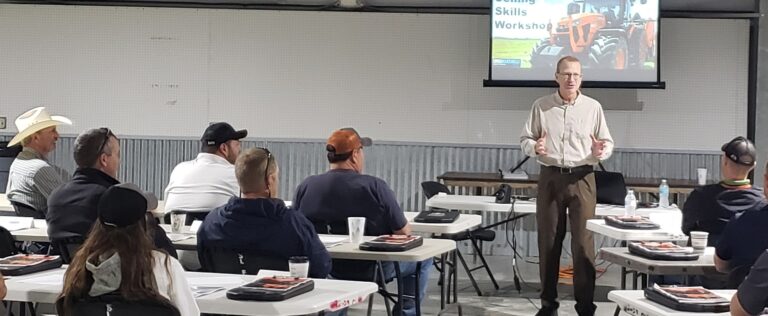Fear doesn’t lurk in the background; it jumps up in front of you and kills your sale
Well-intentioned motivational speakers often turn fear into the acronym: False Evidence Appearing Real. Not true. Fear is real and it’s there for a reason. If you fall off a cliff, you die. That’s real. If you overstep your bounds on a sales call, you lose the sale. That’s real. The older we get, the more experience we have. With this experience, we learn how to avoid the cliffs and pitfalls with customers because we’ve gone down those paths before. The problem is not fear, it’s how we react to it.
Examples:
– Asking a grain producer how many acres he farms. I found out the hard way that this is a sensitive area. After 20 years in the feed business, I knew livestock producers were proud of how many cows they milked or hogs they finished. They were fairly open to telling you this number. When I moved into the grain business, I found out the same is not true for how many acres a person farms. Total acreage is a sensitive area. So, having some caution around that topic is a good thing.
– Asking a livestock producer about a disease outbreak. Again, I found out this is a sensitive area. Livestock producers are very proud of their operation and a disease outbreak on their farm is confidential. Most don’t want to talk about it openly.
Other Sales Killing Fears:
- Pricing too high and missing the sale.
- Pricing too low and missing the margin.
- Asking for payment on a past due bill and risk irritating the customer.
- Calling on the big guy: Often, salespeople will drive right by the big prospects in their area because they are afraid of turning up the driveway and calling on them. They fear they aren’t technically competent enough to call on the big prospect.
- Asking too many prying questions and appearing nosy.
- Asking a Closing question and appearing “Salesy”.
- Fear of becoming a nuisance to a prospect by calling, texting or emailing too often.
If you have been in sales for a while, especially in Ag sales, those fears are real and we certainly need to be aware of them. When coaching a salesperson, I don’t worry when the salesperson has those fears. I worry how they react to those fears.
Too cautious and:
- The salesperson never asks sensitive or high-value questions.
- They then never get past the surface level needs or issues.
- The conversation is reduced to “Show me what you got” and “What’s your price?”
- The salesperson does a PowerPoint presentation dump of their products and just hopes to get lucky on hitting a true need.
Too careless and:
- The salesperson offends or alienates the prospect.
- The prospect shuts down communication to protect themselves.
- The conversation never gets past the surface level needs or issues.
- The conversation is reduced to “Show me what you got” and “What’s your price?”
- No matter what the salesperson does at this point, they will not get the sale as the prospect has lost trust in them.
Just Right:
What’s “Just Right”? It’s a gray area and you have to keep trying to find the balance between fear induced paralysis and reckless sales activity. Here are a few thoughts:
- Understand the dangers, fears, and pitfalls that are out there in the market.
- Have a healthy respect for those dangers, fears, and pitfalls.
- Be self-aware of your reaction to those fears. Get help if you are less self-aware than you should be. Start with your sales manager and branch out to fellow salespeople from there.
- Don’t allow the fear alone to deter you from trying.
- Remember it only takes 20 seconds of bravery to get past your fear. Think of jumping off a cliff into a lake below. You only have to be brave for those first few seconds when you jump. Same with calling on the big prospect. You only have to be brave for the few seconds it takes to turn down their driveway or make that phone call. After that, you’re on. You have no choice but to make the best of it. As with most of these fears, we realize they weren’t worthy of their intensity.
- Separate fact from fiction. This is where the motivation speaker’s message comes in handy. Too often, we discover our fear is completely baseless. Example: You are new to the agronomy team and you have a farmer in your area that used to do business with your retail location. He quit because of some administrative problems or delivery issues years ago and said he would “never” buy from your business again. Your location manager and office person tell you the gory details of him yelling at the delivery driver and warn, “You might as well not waste your time there”. However, he’s right in the middle of your territory and he’s a big account. Here’s my advice. Ignore the rumor and go there immediately. I have done this many times and my estimate is 50% of the time, the angry former customer bought from me. The other 50% asked me nicely to never come back to their farm again. No yelling, screaming or flying wrenches at me. But the 50% that agreed to come back would never have done so if I didn’t separate fact from fiction.
- When confronted with the fear, focus on the tasks at hand. Often, we fear the immense journey of selling a large account or going from a $50,000 territory to a million-dollar territory. Focus on the specific step you are taking on that journey. Master that step and then move to the next. But, keep moving.
- Get used to it. I don’t mean stick your hand in a fire to get used to being burnt. I’m talking about easing your fears by becoming familiar with them. The fear of public speaking is well known. Everyone has it, but some have learned ways to calm those fears. One that works for me is to arrive early, get on stage and familiarize myself with the feeling of being in front of that particular room. Secondly, I like to talk with the audience as they arrive. This allows me to get to know a few people in my audience and understand their view of my topic. Contrast this with walking on stage for the first time to an audience you have never seen. Trust me, it’s much worse. How do you implement this in your selling process? Same way. If you have a viable reason to be in your customers business ahead of an important sales call, then do it. If you are selling to a retail business, go to one of their locations and see the store, the people, and their products in action. If selling to a wholesaler, go to one of their retail customers and see the products in action. That familiarity will boost your confidence and start to build trust as you bring that knowledge to the sales call.
Ever have someone tell you they are afraid of heights. It often makes me laugh because we are all afraid of heights. However, for some, that fear means we don’t even want to get close to the edge of a cliff. For others, we understand that fear and gauge the risk of falling with the benefit of climbing a ladder and getting on our roof to fix it. Be neither fearless nor fearful in your journey to understand the balance you need to keep this sales killer from robbing you of the sale.




